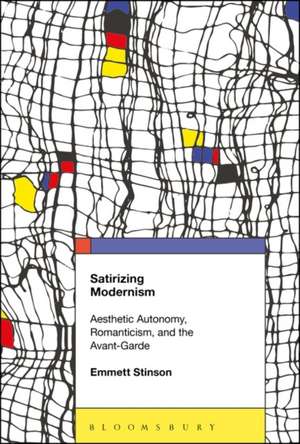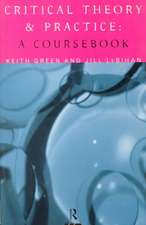Satirizing Modernism: Aesthetic Autonomy, Romanticism, and the Avant-Garde
Autor Dr. Emmett Stinsonen Limba Engleză Hardback – 31 mai 2017
| Toate formatele și edițiile | Preț | Express |
|---|---|---|
| Paperback (1) | 97.77 lei 3-5 săpt. | +18.77 lei 4-10 zile |
| Bloomsbury Publishing – 26 dec 2018 | 97.77 lei 3-5 săpt. | +18.77 lei 4-10 zile |
| Hardback (1) | 773.39 lei 6-8 săpt. | |
| Bloomsbury Publishing – 31 mai 2017 | 773.39 lei 6-8 săpt. |
Preț: 773.39 lei
Preț vechi: 1112.70 lei
-30% Nou
Puncte Express: 1160
Preț estimativ în valută:
148.01€ • 153.95$ • 122.19£
148.01€ • 153.95$ • 122.19£
Carte tipărită la comandă
Livrare economică 14-28 aprilie
Preluare comenzi: 021 569.72.76
Specificații
ISBN-13: 9781501329081
ISBN-10: 1501329081
Pagini: 232
Ilustrații: 2 bw illus
Dimensiuni: 152 x 229 x 24 mm
Greutate: 0.5 kg
Editura: Bloomsbury Publishing
Colecția Bloomsbury Academic
Locul publicării:New York, United States
ISBN-10: 1501329081
Pagini: 232
Ilustrații: 2 bw illus
Dimensiuni: 152 x 229 x 24 mm
Greutate: 0.5 kg
Editura: Bloomsbury Publishing
Colecția Bloomsbury Academic
Locul publicării:New York, United States
Caracteristici
Offers a new perspective on modernism by demonstrating its unacknowledged reliance on aspects of Romantic aesthetics and its continuities with postmodernism
Notă biografică
Emmett Stinson is Lecturer in Literature and Writing at Deakin University, Australia. He is the author, with Richard Pennell and Pam Pryde, of Banning Islamic Books in Australia (2011). He is also editor of By the Book? Contemporary Publishing in Australia (2013).
Cuprins
Acknowledgments1. Introduction: Autonomy, Satire, Romanticism, Avant-Garde2. The Romantic Satire of Romanticism: Thomas Love Peacock's Nightmare Abbey3. Modernism Against Itself: Wyndham Lewis's The Apes of God4. Exhausting Modernism: Satire, Sublimity and Late Modernism in William Gaddis's The Recognitions5. Aporia and the Satiric Imagination: The Limit-Modernism of Gilbert Sorrentino's Imaginative Qualities of Actual Things6. Conclusion: Satire and Radical Apophasis in Evan Dara's The Easy ChainBibliography Index
Recenzii
What happened to satire after its golden age in the eighteenth century? Many critics seem to assume that satire mostly faded away, as romantics turned their attention from political and social folly to poetic genius and natural beauty. ... Emmett Stinson convincingly proposes an alternative narrative in Satirizing Modernism. He argues that a new, self-reflexive kind of satire-dedicated less to social commentary and more to probing the limits of artistic innovation-emerged during romanticism and came to fruition during modernism. . Stinson has successfully pulled on a string that could continue to be untangled for a long time, not only within modernist studies but also within humor studies, American studies, and other fields.
Stinson is compelling when he suggests that modernist literature may always be mocking the values to which it simultaneously subscribes.
An invigorating re-assessment of modernism's susceptibility to its own formal and thematic critiques, rivalries, and negations, one that charts with interpretive flair new ways to think about the political and aesthetic implications of autonomy. This is a must-read book not only for scholars of modernism in general but also for scholars working on the experimental writers Stinson foregrounds (Wyndham Lewis, William Gaddis, and Gilbert Sorrentino). It is an exceptionally judicious reconsideration of the limits and possibilities of an essential emphasis in cultural history.
Satires that relentlessly satirize themselves; artworks that assert their own autonomy only ruthlessly to undermine it. In Emmett Stinson's dazzling account, Romantic and avant-garde satires emerge as forms intent on demolishing the grounds on which they stand in the pursuit of an impossible vision of autonomy from every external value. Dexterously argued, deeply researched, and forcefully written, Satirizing Modernism reveals an extended modernist lineage never more itself than when most at odds with itself.
In Satirizing Modernism, Stinson reveals how modernist strivings for formal autonomy could be traversed by the centrifugal forces of satire and avant-garde aggression. From precursors in romantic prose through modern and contemporary avatars including Wyndham Lewis, William Gaddis, Gilbert Sorrentino, and Evan Dara, Stinson illuminates an innovative counter-tradition of satire turned back upon itself and of autonomous forms reopened by broad, external concerns.
Stinson is compelling when he suggests that modernist literature may always be mocking the values to which it simultaneously subscribes.
An invigorating re-assessment of modernism's susceptibility to its own formal and thematic critiques, rivalries, and negations, one that charts with interpretive flair new ways to think about the political and aesthetic implications of autonomy. This is a must-read book not only for scholars of modernism in general but also for scholars working on the experimental writers Stinson foregrounds (Wyndham Lewis, William Gaddis, and Gilbert Sorrentino). It is an exceptionally judicious reconsideration of the limits and possibilities of an essential emphasis in cultural history.
Satires that relentlessly satirize themselves; artworks that assert their own autonomy only ruthlessly to undermine it. In Emmett Stinson's dazzling account, Romantic and avant-garde satires emerge as forms intent on demolishing the grounds on which they stand in the pursuit of an impossible vision of autonomy from every external value. Dexterously argued, deeply researched, and forcefully written, Satirizing Modernism reveals an extended modernist lineage never more itself than when most at odds with itself.
In Satirizing Modernism, Stinson reveals how modernist strivings for formal autonomy could be traversed by the centrifugal forces of satire and avant-garde aggression. From precursors in romantic prose through modern and contemporary avatars including Wyndham Lewis, William Gaddis, Gilbert Sorrentino, and Evan Dara, Stinson illuminates an innovative counter-tradition of satire turned back upon itself and of autonomous forms reopened by broad, external concerns.















